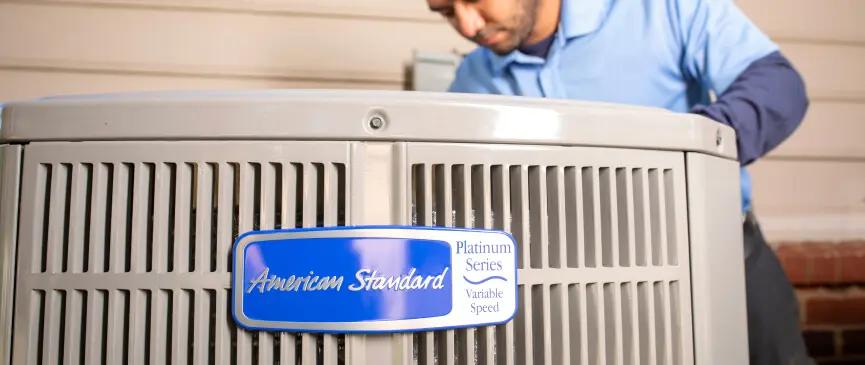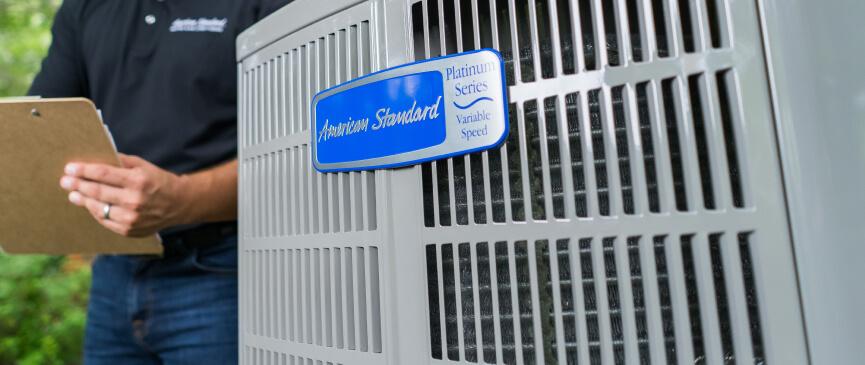Debunking 5 Common Air Conditioning Myths
Learn about 5 air conditioning myths that can harm your system and cost you money.

By Anne Fonda
While it’s not summer yet, you may have already turned on your central air conditioning. If you’re in the northern part of the country, you may just be opening the windows to keep the house cool. Either way, this is a good time of year to debunk some common AC myths.
Let’s get started.
Myth #1: Your AC unit is ready for summer without prep
This is probably the biggest myth. If you haven’t run your air conditioner since last summer or fall, you must give it some TLC before summer. You should also maintain your heat pump before it switches to cooling.
This includes some air conditioner maintenance you can do yourself and some maintenance that should be left to an HVAC professional.
DIY AC maintenance
Check the filter. The most important thing you can do before switching on the AC is to check and/or change the filter. HVAC air filters can become clogged, and that can make your system struggle and even fail.
If you live in an area of the country where you can turn off the heat for a few weeks or even a month but don’t have to turn on the AC, you may not have checked the filter recently. Go check it now.
Clean and clear around the outdoor unit. Check to make sure the area on top of and around your unit is clear of debris, such as leaves, twigs, and overgrown shrubs. Remove any vining plants from the area because they will find a way inside the unit. Trim back any plants within 2-3 feet of the unit to ensure optimal performance.
Clean the coils and fins. This is something that you might be able to do yourself. Google how to clean AC coils and decide. However, an HVAC professional can do this for you.
Professional central air conditioner or heat pump maintenance
For optimal performance of your cooling unit, schedule an AC tuneup each spring. Even if you’ve already started cooling your home, it’s not too late. It can help your system weather the first heat wave of summer.
At an AC tuneup visit, an HVAC technician should:
- Check refrigerant levels
- Check for refrigerant leaks
- Check and tighten electrical connections
- Inspect and clean indoor and outdoor coils
- Clean the condensate line and drip pan
- Lubricate moving parts
- Clean the blower assembly
- Inspect the AC capacitor
- Take voltage and amperage readings
- Check the thermostat
- Check the filter and change it if necessary
- And more
You schedule regular maintenance for your car. If you don’t already, start scheduling regular HVAC maintenance. Your AC system will run more efficiently, and it can prolong the life of the system.
Myth #2: Turn your temperature lower for quicker cooling
Your central air conditioner or heat pump will only cool as fast as the system allows. Setting a lower initial temperature won’t make it cool any faster. Doing that wastes energy and strains your system, which can shorten its lifespan.
What is the 20-degree rule for air conditioners? We’re glad you asked. This is a rule of thumb that your cooling set temperature shouldn’t be more than 20 degrees lower than the outside temperature. For example, if the outdoor temperature is 98 degrees, you should set your thermostat to 78 degrees.
That may sound uncomfortable, but the closer you can keep the indoor temperature to the outdoor temperature, the more efficiently your system works. You can make yourself feel cooler by using ceiling fans and portable fans, which create a windchill effect.
Consider a programmable thermostat or smart thermostat to provide optimal comfort.
Myth #3: The bigger the AC unit, the better
Bigger is not always better. Proper AC sizing is crucial when it comes to cooling your home. If the unit is too small, it won’t cool the house evenly or fully. It might run all the time. If the AC unit is too big, it may cool your house before it reduces the humidity, leaving you feeling cold and clammy.
An HVAC professional is the best person to accurately calculate the size of the AC unit or heat pump you need, but you can also use your home’s square footage to give you an answer to the question, What size AC unit do I need? The following table gives some guidelines.
| Home size (sq. ft.) | Unit Size (tons) | Unit Size (BTUs) |
| 1000 sq. ft. | 2-ton AC unit/2-ton heat pump | 24,000 BTUs |
| 1500 sq. ft. | 3-ton AC unit/3-ton heat pump | 36,000 BTUs |
| 2000 sq. ft. | 4-ton AC unit/4-ton heat pump | 48,000 BTUs |
| 2500 sq. ft. | 5-ton AC unit/5-ton heat pump | 60,000 BTUs |
Myth #4: Close the vents in rooms you don’t use
Should you close vents in unused rooms in the summer? In a word, no. You can partially close them to try and redirect cool air to other rooms but don’t close them completely. This will affect the airflow balance your HVAC system needs to operate efficiently. Your system was designed with the idea that all vents would be open.
Myth #5: Better to let an air conditioner run until it quits
We understand that you want to get the most use out of your central air conditioner. With regular AC maintenance, such as AC tuneups and changing the filter, you can prolong the life of your central AC unit. But running it until it quits may not be the best idea.
Why? Because the older a central air conditioning unit gets, the more inefficient it becomes, and the more frequent repairs can be. This means higher energy bills and more money for air conditioning repair.
If your AC unit is 15 years old, it’s time to consider replacing it, especially if you’re having some of these issues:
- Refrigerant leak
- High energy bills
- More frequent and costly repairs
- Inefficient cooling
- High humidity
While getting a new air conditioner or matched system will cost more upfront than repairs, by replacing the unit or system, you can save on your energy bills and save on repair bills. According to Energy.gov, even if your AC unit is only 10 years old, you could save 20-40% on your cooling costs by replacing it with a newer, more efficient unit.
For more information, visit our Repair or Replace Guide for some tips on making this decision for your home.
Consult with the air conditioning experts
Whether you need AC repair or you’re considering air conditioning replacement, turn to your local American Standard dealer for the facts. Our dealers have years of expertise in HVAC repair and HVAC replacement and will offer you recommendations tailored to you and your home.
For over 100 years, we’ve designed and manufactured some of the most awarded, well-engineered heating and cooling equipment and earned a reputation for doing things right.
Anne Fonda, Content Writer
A Content Writer with Trane Technologies, Anne Fonda researches topics and writes for Trane® and associated residential HVAC brands. She works in collaboration with Trane Technologies subject matter experts, offering easy-to-understand, informative content on complex topics. Her goal is to help consumers make informed decisions on the products and services they need.
She has written for HVAC and other service provider websites for over 16 years. Before transitioning to web content writing, Anne had a 14-year stint as an award-winning journalist. She graduated cum laude from the University of Missouri-Columbia School of Journalism.
When she’s not working, Anne enjoys playing word games, reading, gardening, spending time with family, and visiting gardens and museums.
Expert review by Kimberly Sexton, Senior Systems Engineer



